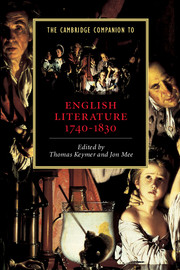Book contents
- Frontmatter
- Part I Contexts and modes
- 1 Readers, writers, reviewers, and the professionalization of literature
- 2 Criticism, taste, aesthetics
- 3 Literature and politics
- 4 Literature, national identity, and empire
- 5 Sensibility
- 6 Theatrical culture
- 7 Gothic
- Part II Writers, circles, traditions
- Index
- Series list
4 - Literature, national identity, and empire
from Part I - Contexts and modes
Published online by Cambridge University Press: 28 May 2006
- Frontmatter
- Part I Contexts and modes
- 1 Readers, writers, reviewers, and the professionalization of literature
- 2 Criticism, taste, aesthetics
- 3 Literature and politics
- 4 Literature, national identity, and empire
- 5 Sensibility
- 6 Theatrical culture
- 7 Gothic
- Part II Writers, circles, traditions
- Index
- Series list
Summary
'I have no knowledge of either Sanscrit or Arabic', admitted Thomas Macaulay, in the middle of his 1835 Minute on Indian Education;
But I have done what I could to form a correct estimate of their value. I have read translations of the most celebrated Arabic and Sanscrit works. I have conversed both here and at home with men distinguished by their proficiency in the Eastern tongues. I am quite ready to take the Oriental learning at the valuation of the Orientalists themselves. I have never found one among them who could deny that a single shelf of a good European library was worth the whole native literature of India and Arabia.
With its profound faith in what Macaulay identified without hesitation as Britain’s intrinsic cultural superiority – articulated through a sweeping contempt for other cultures that was in turn founded not on the profession of an immediate and detailed knowledge of the Other (the hallmark of Orientalist thought in the time of Sir William Jones, a mere thirty or forty years earlier) but rather on an exaggerated sense of mediation, generalization, distancing, almost ignorance – the Minute on Indian Education signalled the abrupt end of over a century of British indecisiveness about the East.
- Type
- Chapter
- Information
- The Cambridge Companion to English Literature, 1740–1830 , pp. 61 - 79Publisher: Cambridge University PressPrint publication year: 2004
- 1
- Cited by

